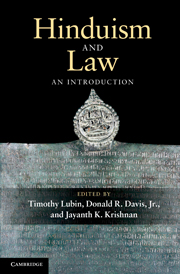Introduction
Published online by Cambridge University Press: 05 June 2012
Summary
Law and religion have much in common as social institutions and as historical phenomena. Broad areas of overlap and even broader areas of complementariness between these spheres have been observed in Roman, Judaic, Christian, and Islamic societies, and have generated a vast literature. There is also a rich ethnographic literature on law in nonliterate societies, emphasizing dispute resolution, informal legal process, and cultural context. Yet India’s potential contribution to this field has remained almost completely unnoticed, despite both the fact that the Hindu and Buddhist religions have produced vast and highly refined legal literatures, and the fact that the Hindu religious texts and Indian legal practices became the focus of intense scrutiny by European scholars during the centuries of colonial administration. This volume is intended to begin to rectify this oversight by offering an up-to-date and accessible analysis of the main features and periods of what has conventionally been called Hindu law, and of the interrelations between law and Hinduism more broadly, up to the present day. Furthermore, several of the chapters break new ground in developing interdisciplinary approaches to the study of Hinduism and law – for example, in examining the literary articulations or the ritual dimensions of law in Hindu contexts.
“Hinduism”
Numerous stumbling blocks lie before the readers of this book. Its title itself displays two of them: “Hinduism” and “law.” The term “Hinduism” is of modern coinage, and was not used by any Hindus themselves as a religious category until the middle of the nineteenth century, when they began to appropriate it from European usage. “Hindu” was initially more an ethnic label than a religious one. The Persians, and then the Greeks, used it to refer to the peoples living around and beyond the Sindhu River (which they pronounced “Hindu”; “Indus” and its derivate “India” reflect the Latinized form of the Perso-Greek name). Indians (of whatever religion) do not seem to have applied the label to themselves until after Turkic rulers had established Persianate Islamic kingdoms in several parts of India, especially after 1206; late medieval works speak of “Turaka” or “Turuṣka,” which designated ethnic Turks and Arabs, and only secondarily Muslims in general, much as in earlier centuries “Yona” (or “Yavana”) was applied not merely to Ionians but to any denizen of “the West” (i.e., Persia and beyond). Vis-à-vis the “Turaka,” “Hindu” meant simply Indian.
- Type
- Chapter
- Information
- Hinduism and LawAn Introduction, pp. 1 - 14Publisher: Cambridge University PressPrint publication year: 2010
- 1
- Cited by



